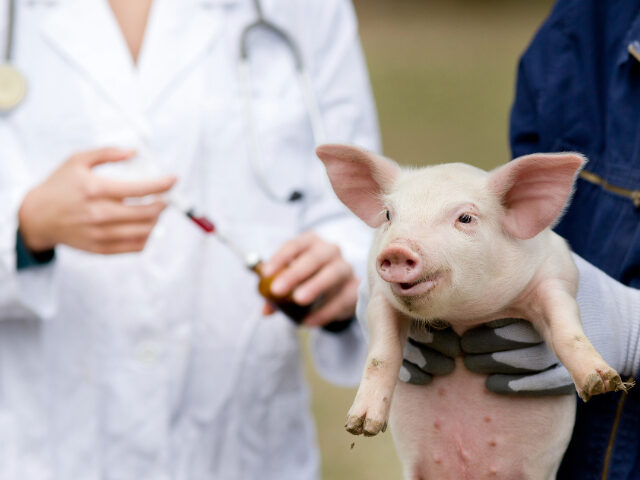Scientists at China’s Air Force Medical University in Shaanxi, an institution affiliated with the People’s Liberation Army (PLA), announced on Friday the successful transplant of a gene-edited pig liver into the body of a brain-dead human patient.
The experiment was designed to test the human body’s ability to accept the altered animal organ, a procedure known as xenotransplantation. If the claim from the Air Force Medical University team is internationally verified, it will stand as the world’s first pig-to-human liver transplant. American doctors previously used similar techniques to transplant pig kidneys and hearts into brain-dead human bodies.
According to a WeChat post from the transplant team, the human patient displayed “good” blood and liver bile flow, with no signs of organ rejection, 96 hours after the surgery was performed. The procedure involved keeping the patient’s original human liver joined with the transplanted pig organ with spliced veins since even gene-edited pig livers cannot duplicate all of the functions of a human liver.
The gene editing process was necessary to remove three antigens that would normally cause a human body to reject the transplant, replacing them with human proteins.
The team expressed hope that xenotransplantation could “benefit more patients with end-stage liver disease” and potentially eliminate the need for human liver donors entirely in the future. For the time being, transplanting an organ as complex as the liver is a temporary therapy at best because the not-quite-perfect match considerably shortens the recipient’s lifespan.
On Friday, China’s state-run Global Times triumphantly predicted the experimental process will “play an irreplaceable role in treatment and repair, functional reconstruction, and transplantation substitution, especially in vital organ transplantation”:
China has nearly 400 million liver disease patients, including over 7 million with cirrhosis, and the number of patients with liver failure is 300,000 to 500,000 every year. In cases of liver failure, liver transplantation is the only effective cure. However, the number of organs donated by humans is far smaller than the demand, so carrying out xenotransplantation research is of great importance and is expected to benefit more patients with end-stage liver disease.
The Global Times expressed gratitude to the family of the patient, who was rendered brain-dead by a severe head injury, for donating his body to the experiment without receiving financial compensation.
Pig livers have long been at the forefront of research to alleviate human organ shortages by developing animal substitutes. A Minneapolis-based company called Miromatrix has been working on a radical editing process that extensively remodels a pig liver to become a near-human replacement — a radical bioengineering process that essentially scrubs out all the pig cells, leaving a ghostly husk of tissue that can be rebuilt with donated human liver cells.
One advantage to this approach is that the pig liver can begin the process as nothing special — the organs can simply be harvested from slaughterhouses. The necessary human cells can be harvested from donated kidneys deemed unsuitable for full transplantation.
The Miromatrix development plan for the near future involves connecting its modified pig livers externally to human patients who require blood filtration, rather than transplanting the renovated organ into the human body. Approval from the Food and Drug Administration (FDA) for even that limited outside-the-body procedure has proven difficult to obtain, so full-blown xenotransplantation trials could be years away.

COMMENTS
Please let us know if you're having issues with commenting.